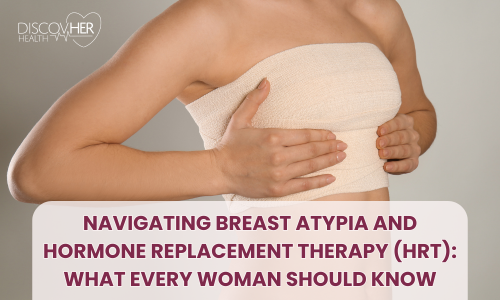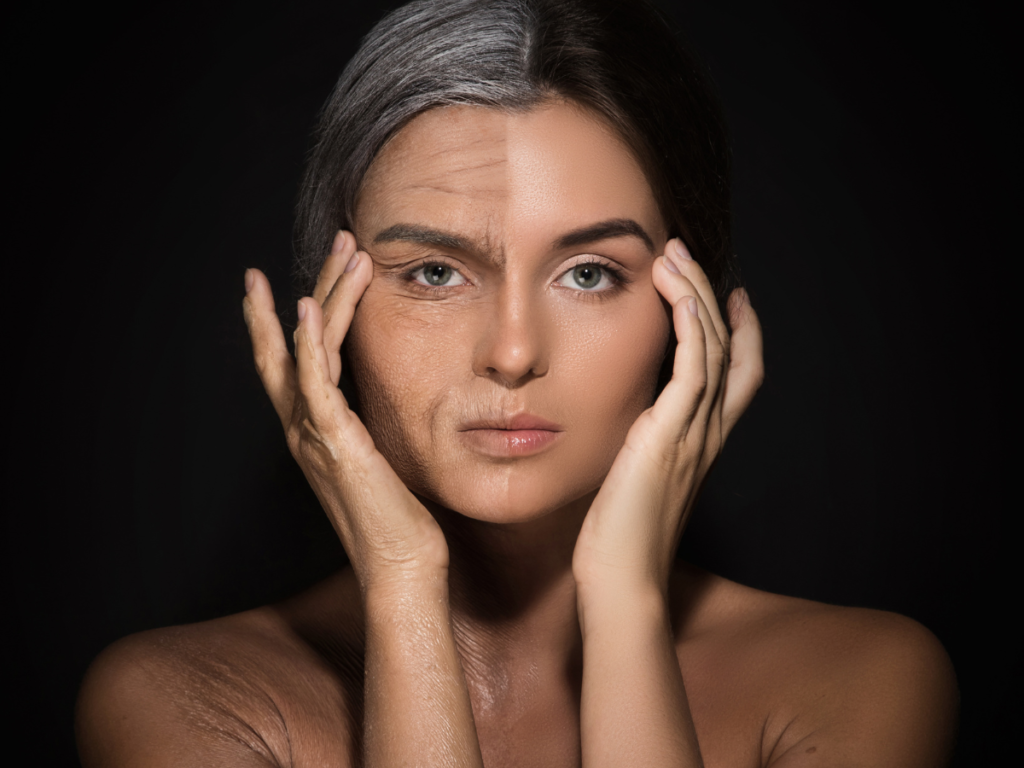Navigating Breast Atypia and Hormone Replacement Therapy (HRT): What Every Woman Should Know

When it comes to navigating health concerns that impact your quality of life, finding the right balance between risk and relief can feel overwhelming. This is especially true for women dealing with a history of atypical breast changes, such as atypical ductal hyperplasia (ADH) or atypical lobular hyperplasia (ALH), who are considering hormone replacement therapy (HRT).
At DiscovHER Health, we understand the complexity of this decision. That’s why we’ve created this guide to help women—like you—who are seeking clarity and guidance on this often misunderstood topic.
Understanding Atypical Breast Changes and HRT
Atypical breast changes, including ADH and ALH, are benign (non-cancerous) conditions. However, they are associated with a slightly higher risk of developing breast cancer in the future. Naturally, this can raise concerns about whether HRT—a treatment used to alleviate menopause symptoms—might increase this risk.
To address these concerns, we look to evidence-based guidelines and emerging research. Currently, major organizations such as The Menopause Society, The American College of Obstetricians and Gynecologists (ACOG), and the National Comprehensive Cancer Network (NCCN) recommend prioritizing nonhormonal treatments for managing menopause symptoms in women with a history of atypical breast changes.
But what if nonhormonal options aren’t enough?
Introducing Duavee: A Potential Option for Women with Breast Atypia
One option worth discussing with your healthcare provider is Duavee (bazedoxifene/conjugated estrogens). This FDA-approved treatment is designed to manage vasomotor symptoms (like hot flashes) in postmenopausal women.
What makes Duavee unique is that it combines estrogen with a selective estrogen receptor modulator (SERM), which helps to reduce the risk of uterine hyperplasia (a thickening of the uterine lining that can occur with estrogen use). Preliminary data also suggests that Duavee may have protective effects against breast cancer, and it is currently being studied in the NCI PROMISE Trial, which focuses on women at high risk of developing breast cancer.
This promising data offers hope for women navigating the difficult balance of managing menopause symptoms while being mindful of breast health.
What Does the Research Say About HRT and Breast Cancer Risk?
The conversation around HRT and breast cancer risk is nuanced, and there are no definitive guidelines when it comes to using HRT in women with a history of ADH or ALH. However, some reviews suggest that modern HRT formulations may not substantially increase the risk of breast cancer.
For example, a 2023 review by Sourouni and Kiesel explored the relationship between menopausal hormone therapy and breast health, concluding that current evidence does not show a significant rise in breast cancer risk with the use of newer HRT formulations.
That said, it’s important to note that no large, randomized controlled trials have specifically studied HRT use in women with ADH, ALH, or ductal carcinoma in situ (DCIS). Therefore, this remains a controversial and evolving area of women’s health.
What We Recommend at DiscovHER Health
At DiscovHER Health, we believe in empowering you to make informed decisions about your health. If you’re considering HRT and have a history of atypical breast changes, here’s how we approach your care:
- Thorough Risk Assessment: We evaluate your personal and family history of breast cancer, as well as any other risk factors.
- Education and Discussion: We provide evidence-based information on all your options, including nonhormonal treatments and alternatives like Duavee.
- Personalized Treatment Plans: If you choose to pursue HRT, we work with you to create a regimen tailored to your needs, while prioritizing safety and close monitoring.
- Ongoing Breast Cancer Screenings: Whether or not you choose HRT, staying current with regular mammograms, breast MRIs (if recommended), and other screenings is critical.
Key Takeaways for Women Considering HRT
- Nonhormonal options are the first-line recommendation for women with a history of atypical breast changes.
- Duavee is an emerging option with potential breast-protective benefits and is worth discussing with your provider.
- There’s no one-size-fits-all solution. The decision to use HRT should be based on your individual risk factors, lifestyle, and preferences.
- Stay proactive about breast health. Routine screenings and open communication with your healthcare team are vital.
Let’s Have the Conversation
You deserve to feel heard and supported as you navigate menopause and your breast health. At DiscovHER Health, we’re here to guide you every step of the way with compassionate care and expert advice.
If you’d like to explore your options or have questions about HRT, schedule an appointment with us today. Together, we can create a plan that prioritizes your wellness—inside and out.
Ready to feel confident about your next steps? Contact us today to learn more about your options or book a consultation.
Resources for Further Reading:
- Sourouni M, Kiesel L. Menopausal Hormone Therapy and the Breast: A Review of Clinical Studies. Breast Care (Basel). 2023.
- Temkin SM et al. The role of menopausal hormone therapy in women with or at risk of ovarian and breast cancers. Cancer. 2019.
- Huber D et al. Hormone replacement therapy in BRCA mutation carriers and risk of ovarian, endometrial, and breast cancer: A systematic review. J Cancer Res Clin Oncol. 2021.
About Us
Jenna Perkins is a board certified Women’s Health and Gender Related Nurse Practitioner with extensive knowledge and experience in Urogynecology, Pelvic Pain, Sexual Health, and complex Gynecology. She is founder of DiscovHER Health, Northern Virginia’s premier destination for women’s healthcare and expertly curated products.
DiscovHER Health Offers cutting edge treatments
Pelvic Health + Wellness
- FormaV vaginal regeneration
- PTNS Bladder control
- Morpheus8v
- VTone
- SoLa Pelvic Therapy
- Dysis Colposcopy
- Pelvic Reset
Skincare | Face + Body
Body Toning + Tightening
Weight Loss Program
Where are we located?
We are located in Alexandria, Virginia, and serve patients from all over the Mid-Atlantic including Washington DC, Alexandria, Baltimore, and Chevy Chase







Leave a Comment